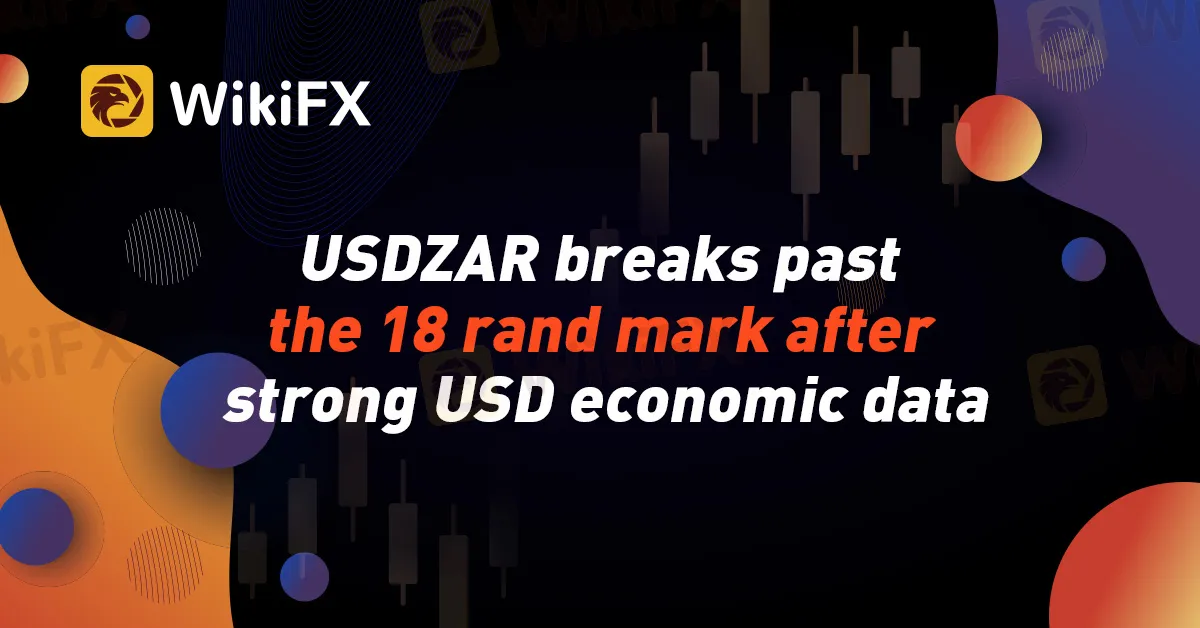简体中文
繁體中文
English
Pусский
日本語
ภาษาไทย
Tiếng Việt
Bahasa Indonesia
Español
हिन्दी
Filippiiniläinen
Français
Deutsch
Português
Türkçe
한국어
العربية
USDZAR breaks past the 18 rand mark after strong USD economic data
Abstract:The latest economic data for the USA has been positive as the dreaded inflation that has been the nightmare of USA economists is showing signs of slowing down. Now that we have reached these new historic highs what should South African traders expect to encounter going into the future?

The latest economic data for the USA has been positive as the dreaded inflation that has been the nightmare of USA economists is showing signs of slowing down. This positive news along with the negative political and economic situation that South Africa finds itself in under the current energy crisis has meant the rand has taken quite the slump. Now that we have reached these new historic highs what should South African traders expect to encounter going into the future?
The current economic and political situation in South Africa is not so inviting to foreign investors. The current energy crisis in South Africa regularly hampers economic productivity as daily there are energy-reliant industries that suffer through the load shedding. To add salt to injury, the energy company that is pushing the whole country is partly running on diesel backup generators that are constantly racking up huge debt for the government and the country. The issue is out of hand to the point that the president himself has declared a state of emergency. There are several projects underway to bolster the power supply however one can expect that there will be some time taken to reach full energy capacity again (thats if it will be reached at all).
On the USA side, however, we recently got news of a reduced inflation rate. This is good news as there can be more credit made available by the FED and more economic activity can be encouraged. In contrast to the stark recession fears, this good news is well received and has caused several shifts in the markets.
The negative outlook of the South African economy when contrasted with the positive outlook of thee USA economy shifted the forces of supply and demand in the favor of the USD and hence we are now seeing the USDZAR climb to historic levels .
What should we look for as traders ?
The next FOMC meeting minutes on the 22 of February is set to bring about market volatility for the USD currency and hence the USDZAR currency pair is also bound to show massive movements. Make sure to have your important resistance and support areas marked out during that announcement. A day before that we will also be receiving key economic data from the South African side (employment figures). If that data is positive we can then assume the trend will halt for a while, otherwise if it is negative we should expect this trend to continue.

Disclaimer:
The views in this article only represent the author's personal views, and do not constitute investment advice on this platform. This platform does not guarantee the accuracy, completeness and timeliness of the information in the article, and will not be liable for any loss caused by the use of or reliance on the information in the article.
Read more

The Impact of Interest Rate Decisions on the Forex Market
Interest rate changes determine currency attractiveness, influencing capital flows and exchange rate trends. Understanding this mechanism helps investors navigate the forex market effectively.

March Oil Production Declines: How Is the Market Reacting?
Oil production cuts in March are reshaping the market. Traders are closely watching OPEC+ decisions and supply disruptions, which could impact prices and future production strategies.

How to Calculate Leverage and Margin in the Forex Market
Leverage amplifies both potential profits and risks. Understanding how to calculate leverage and margin helps traders manage risks and avoid forced liquidation.

RM1.29 Million Lost in ‘C Baird VIP’ WhatsApp Scam
A 43-year-old company auditor and subcontractor in Malaysia became the latest victim of an elaborate investment scam after losing RM1.29 million to a fraudulent scheme promoted via WhatsApp.
WikiFX Broker
Latest News
The Withdrawal Trap: How Scam Brokers Lure Victims into Paying More
FCA to Investors: Think Twice Before Trusting These Brokers
Trump\s tariffs: How could they affect the UK and your money
Trump gambles it all on global tariffs he\s wanted for decades
TradingView Brings Live Market Charts to Telegram Users with New Mini App
Trump tariffs: How will India navigate a world on the brink of a trade war?
Interactive Brokers Launches Forecast Contracts in Canada for Market Predictions
Authorities Alert: MAS Impersonation Scam Hits Singapore
Stocks fall again as Trump tariff jitters continue
IG Group Acquires Freetrade for £160M to Expand UK Investment Market
Currency Calculator







